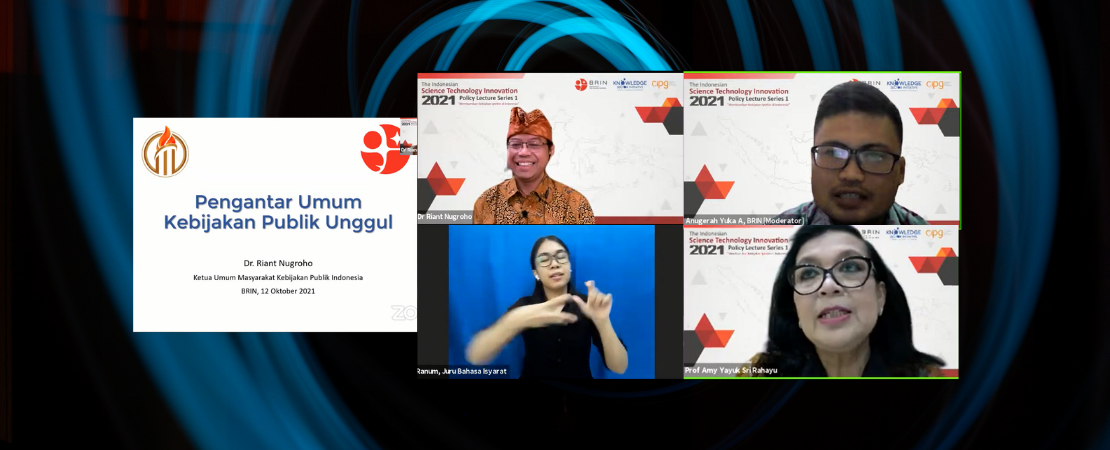JAKARTA, October 12, 2021 — Communicating policies to the public is more important than simply making them aware of these policies through disemmination activities. Policy communication means involving the public since the first process of the development of the policy. Meanwhile, policy disemmination only focuses on informing the public without involving them in the policy-making process.
This is the common thread from The Indonesian Science Technology Innovation (STI) Policy Lecture Series I – 2021 which was held online, Tuesday (12/10/2021). The discussion was entitled “Public Policy: Theory and Practice” organized by the Knowledge Sector Initiative (KSI) in collaboration with the National Research and Innovation Agency (BRIN) and the Center for Innovation Policy and Governance (CIPG).
The discussion was opened by the Acting Director of Research, Technology and Innovation Policy Formulation of BRIN Dudi Hidayat with the General Chair of the Public Policy Society, Riant Nugroho and Professor at the Faculty of Administrative Sciences, University of Indonesia, Prof. Dr. Amy Yayuk Sri Rahayu as the speakers. As a moderator is Anugerah Yuka Asmara as an Associate Researcher for BRIN Policy.
According to Riant, a public policy will run effectively if the public takes part in the policy-making process. Public opinions need to be heard from the time the policy starts to be developed. Public participation constitutes a part of communicating the policy.
“Policy disemmination means informing the public that there is a new policy. However, it is merely a notification, and no public involvement in policy making. Eliminate the word disemmination. This is because there is no policy disemmination. What exists is policy communication,” said Riant.
Poor communication, Riant added, is what makes policies ineffective. However, he underlined that policy communication to the public needs time and has to be conducted efficiently. Good and efficient policy communication will make the public understand and able to implement the policy.
In line with Riant, Amy added that communication is one of the important variables in policy making. Other variables include public consultation, public contribution in the development of the policy content, and public understanding on the benefits of the policy.
"These indicators are compiled in a questionnaire and addressed to respondents who are the members of the community who will be affected by the policy," said Amy.
And policy communication process, continued Amy, should be backed up by sufficient resources, such as human resources, funding, and equipment. These resources are needed to communicate and implement policies down to the grass root level.
Amy reminded that it is important to ensure that policy research focuses on public issues that are currently of concern to the public. Research should be designed to help identify public issues correctly in the process of policy formulation, implementation, analysis, and evaluation. Pragmatic research methods and designs can provide objective results in the form of field data and information about public issues.
“Support of data and information related to policies can improve and upgrade the quality of public policies, as well as that of policy analysts. Public policy research prevents decision makers and policy analysts from working without accurate and objective evidence,” said Amy.
Big challenges
In his opening remarks, Dudi said that policies based on science, technology, and innovation are the keys to the progress of a country. Without a strong foundation of science, technology, and innovation, a country will find it difficult to transform from being a developing one to become a developed one. The Indonesian government has explicitly stated in its policy that science and technology (science and technology) will be the foundation of development in this country. This is stated in Law Number 11 of 2019 concerning the National System of Science and Technology.
“I am sure that no progress will be made without the application of science and technology. And in this regard, Indonesia still needs improvement. Although since the 1970s there have been efforts to develop science and technology for development, until now its contribution to economic development in Indonesia is still relatively small. This is a challenge for all of us,” said Dudi.
Dudi gave an example of South Korea, China, and Taiwan which have proven that by building science and technology capabilities, they have successfully done this transformation. It is undeniable that the progress achieved by these countries is made possible thanks to their growing competence in science and technology. What’s more, the government also provide support through effective policy interventions.
“In short, the role of government policies in advancing the science and technology sector which in turn advances the national economy has been very evident. In the context of Indonesia, policies in this area are still relatively underdeveloped. If you visit several universities in Indonesia, the theme of science and technology policies is still relatively rare," said Dudi.
The Indonesian STI Policy Lecture Series aims to make efforts to communicate and disseminate science and technology issues and policies to the wider community in Indonesia. The communication and dissemination model of this activity is held periodically and continuously. This discussion series involves the government, academia, policy research institutions, the private sector and other civil society/community organizations to act as resource persons and active participants. (*)






